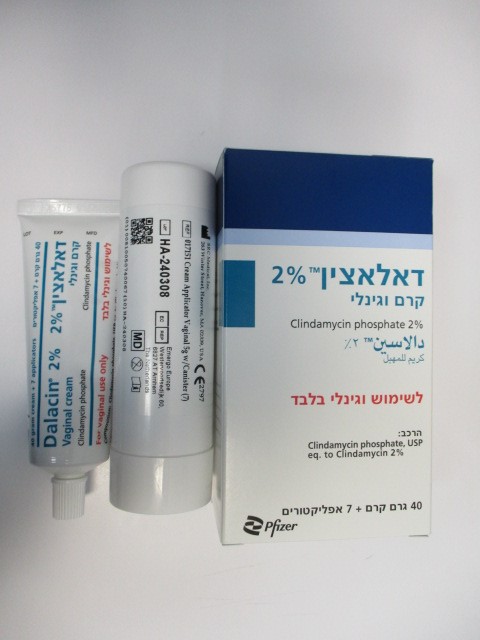Quest for the right Drug

דאלאצין % 2 קרם וגינלי DALACIN 2 % VAGINAL CREAM (CLINDAMYCIN PHOSPHATE)
תרופה במרשם
תרופה בסל
נרקוטיקה
ציטוטוקסיקה
צורת מתן:
וגינלי : VAGINAL
צורת מינון:
קרם : CREAM
עלון לרופא
מינוניםPosology התוויות
Indications תופעות לוואי
Adverse reactions התוויות נגד
Contraindications אינטראקציות
Interactions מינון יתר
Overdose הריון/הנקה
Pregnancy & Lactation אוכלוסיות מיוחדות
Special populations תכונות פרמקולוגיות
Pharmacological properties מידע רוקחי
Pharmaceutical particulars אזהרת שימוש
Special Warning עלון לרופא
Physicians Leaflet
Pregnancy & Lactation : הריון/הנקה
4.6 Fertility, pregnancy and lactation Pregnancy Page 2 of 7 2014-0004758 Use of clindamycin is not recommended during the first trimester, as there are no adequate and well-controlled studies in pregnant women over this period. In clinical trials, intravaginal use of clindamycin vaginal products in pregnant women during second trimester and systemic use of clindamycin phosphate during the second and third trimester has not been associated with congenital abnormalities. Clindamycin may be used to treat pregnant women if clearly necessary during the second and third trimester of pregnancy. Reproduction studies performed in rats and mice using oral and parenteral doses of clindamycin, ranging from 100 to 600 mg/kg/day, have revealed no evidence of harm to the fetus due to clindamycin (see section 5.3). In one mouse strain, cleft palates were observed in species treated fetuses; this response was not produced in other mouse strains or in other species, and is therefore considered to be a strain specific effect. Animal reproduction studies are not always predictive of human response. In a clinical trial in pregnant women during the second trimester, Dalacin® 2% Vaginal Cream was effective in treating bacterial vaginosis, and no drug-related medical events were reported in the neonates. However, as with any drug used during pregnancy, a careful risk-benefit assessment should take place beforehand. Breast-feeding It is not known if clindamycin is excreted in human breast milk following the use of vaginally administered clindamycin vaginal cream. Clindamycin has been reported to appear in human breast milk in ranges from <0.5 to 3.8 µg/ml following systemic use. Clindamycin has the potential to cause adverse effects on the breastfed infant’s gastrointestinal flora such as diarrhoea or blood in the stool, or rash. If oral or intravenous clindamycin is required by a nursing mother, it is not a reason to discontinue breastfeeding, but an alternate drug may be preferred. The developmental and health benefits of breastfeeding should be considered along with the mother’s clinical need for clindamycin and any potential adverse effects on the breastfed child from clindamycin or from the underlying maternal condition. Fertility Fertility studies in rats treated orally with clindamycin revealed no effects on fertility or mating ability. No animal fertility studies have been performed using the vaginal route of administration.

שימוש לפי פנקס קופ''ח כללית 1994
לא צוין
תאריך הכללה מקורי בסל
לא צוין
הגבלות
לא צוין
מידע נוסף
עלון מידע לצרכן
08.11.21 - עלון לצרכן אנגלית 06.10.21 - עלון לצרכן עברית 08.11.21 - עלון לצרכן ערבית 06.12.22 - עלון לצרכן עברית 11.05.23 - עלון לצרכן אנגלית 11.05.23 - עלון לצרכן עברית 11.05.23 - עלון לצרכן ערבית 26.03.12 - החמרה לעלון 17.05.15 - החמרה לעלון 20.01.21 - החמרה לעלון 06.10.21 - החמרה לעלון 06.12.22 - החמרה לעלוןלתרופה במאגר משרד הבריאות
דאלאצין % 2 קרם וגינלי